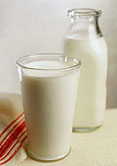
TUESDAY, Feb. 9 (HealthDay News) — Children born to mothers who drink lots of milk and have a high dietary intake of vitamin D during pregnancy have a much lower risk of developing multiple sclerosis later in life, researchers say.
The new study included 35,794 U.S. nurses whose mothers provided information about their experiences and diet during pregnancy. The nurses were followed for 16 years, and 199 of them developed multiple sclerosis (MS) during that time period.
“The risk of MS among daughters whose mothers consumed four glasses of milk per day [during pregnancy] was 56 percent lower than daughters whose mothers consumed less than three glasses of milk per month,” Dr. Fariba Mirzaei, of the Harvard School of Public Health in Boston, said in a news release from the American Academy of Neurology.
“We also found the risk of MS among daughters whose mothers were in the top 20 percent of vitamin D intake during pregnancy was 45 percent lower than daughters whose mothers were in the bottom 20 percent for vitamin D intake during pregnancy,” Mirzaei added.
The study findings were released online Feb. 9 and will be presented in April at the annual meeting of the American Academy of Neurology in Toronto.
“There is growing evidence that vitamin D has an effect on MS,” Mirzaei said. “The results of this study suggest that this effect may begin in the womb.”
The three most important sources of vitamin D are fortified milk, fatty fish such as salmon and exposure to sunlight.
More information
The U.S. National Institute of Neurological Disorders and Stroke has more about multiple sclerosis.

